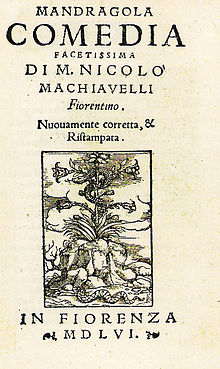Mandragola
| The Mandrake | |
|---|---|

Cover plate from 1556 edition
|
|
| Written by | Niccolò Machiavelli |
| Characters |
|
| Date premiered | Carnival season, 1526 |
| Place premiered | Florence, Italy |
| Original language | Italian |
| Genre | Comedy |
| Setting | The Florentine Republic, 1504 |
The Mandrake (Italian: La Mandragola [la manˈdraːɡola]) is a satirical play by Italian Renaissance philosopher Niccolò Machiavelli. Although the five-act comedy was published in 1524 and first performed in the carnival season of 1526, Machiavelli likely wrote The Mandrake in 1518 as a distraction from his bitterness at having been excluded from the diplomatic and political life of Florence following the 1512 reversion to Medici rule. Both contemporary and modern scholars read the play as an overt critique of the House of Medici; however, Machiavelli set the action in 1504 during the period of the Florentine Republic in order to express his frustrations without fear of censure from patrons already ill-disposed towards him and his writing.
The Mandrake takes place over a 24-hour period. The protagonist, Callimaco, desires to sleep with Lucrezia, the young and beautiful wife of an elderly fool, Nicia. Nicia above all else desires a son and heir, but still has none. Callimaco, conspiring with Ligurio, a rascally marriage broker, and a priest, masquerades as a doctor. He convinces Nicia to drug Lucrezia with mandrake, claiming it will increase her fertility. He adds, however, the dire warning that the mandrake will undoubtedly kill the first man to have intercourse with her. Ligurio helpfully suggests to Nicia that an unwitting fool be found for this purpose. A reluctant Lucrezia is eventually convinced by her mother and the priest to comply with her husband's wishes. She allows a disguised Callimaco into her bed and, believing that the events which caused her to break her marriage vows were due to divine providence, thereafter accepts him as her lover on a more permanent basis.
The play is mentioned in the 16th Letter of Amabed in Voltaire's Les Lettres d'Amabed (1769) stating that "the piece mocks the religion which Europe preaches, of which Rome is the centre, and the throne of which is the Papal See". Other critics like John Najemy have interpreted scenes with priest as Machiavelli pointing out "the social and political necessity of interpreting religion".
Wallace Shawn's translation, commissioned by Joseph Papp, was staged in 1977 at the Public Theater in Manhattan, and it launched Shawn's acting career as well.
...
Wikipedia
